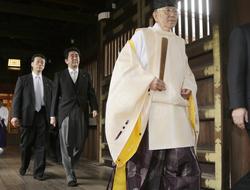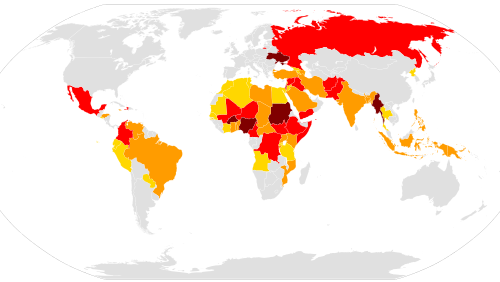BlandOatmeal
Active Member
SHIFTING STRATEGIC ALLIANCES
The world political map has been, since the ascension of Barack Obama to the throne of America, undergoing a paradigm shift -- or, alternatively, a series of paradigm shifts. Some of the major movements are:
1. The "Arab Spring" revolutions, of 2011 in which the US called for the ouster of long-standing US Ally Hosni Mubarak in Egypt, and engineered the brutal execution of Libyan leader Muammar Gaddafi. In both these cases, as well as in Tunisia, the Muslim Brotherhood (MB) and Al Qaeda (MB) came out as the big winners. Turkey and Gaza were already ruled by MB-affiliated parties, and the Moroccan government followed suit. When civil strife then broke out in Syria and Yemen as well, President Obama threw his full weight behind these Sunni Islamist parties. The Qataris moved in lock step, investing billions of dollars into the MB government of the new Egyptian President Morsi. The Saudis had been old friends and allies of Hosni Mubarak, and were incensed at Obama's meddling to depose him.
2. The Egyptian counter-revolution of 2013, engineered and financed by Saudi Arabia, removed Morsi; and now the MB is listed there as a terrorist organization -- as is the related HAMAS in Gaza. At the same time as the change of government in Egypt, opposition groups in Tunisia began clamoring to oust their own MB leaders. Libya, meanwhile, has become an anarchic collection of local militias, and a spawning ground for international terrorists. The MB advances in Yemen have been neutralized; and despite MB victories in Morocco, that country's close ties with the Saudis have not been broken.
3. The last stand of the MB, and Obama's backing of it, was in Syria, where the American President drew a "line in the sand" at President Assad's use of chemical weapons. The French, Turks, Qataris, Saudis and Israelis stood firmly with Obama; but then the British deserted him, and he had to go scurrying to the Russians to help him out of the diplomatic corner he had painted himself into. The Russians helped, only to put Obama and the Americans firmly into the Russian-Iranian-Syrian orbit, and to further distance him from the Israelis, Saudis, Egyptians, Turks, Gazans and Qataris.
4. The most damning blunder of Obama in this transaction, has been to allow the Iranians to continue pursuing their program of building a nuclear weapon capability. This has led to flat-out animosity from nearly all Israelis, and has caused the Saudis to go ahead with plans to deploy their own nuclear weapons. Those weapons have been purchased from Pakistan, a close ally of China. India, meanwhile, being an ally of Russia and Japan (which has meanwhile become more unfriendly than ever with China), and a foe of both China and Pakistan, has strengthened ties with the now-American-aligned Iran.
5. There is now a three-way split in the world. The US-British-Russian-Iranian-Indian-Japanese bloc is, of course, the most powerful. A second bloc consists of MB-Al Qaeda remnants: Turkey, Qatar, Gaza and the Syria-Iraq opposition forces (Syria and Iraq have become essentially one country, engaged in a trans-border civil war pitting Shiites against Sunnis). The third block, meanwhile, has been busy collecting allies. The Saudis have lost their old Qatari partners; and other allies such as the UAE are wavering between them and the American-Iranian bloc; but they are strongly allied with Egypt, cooperating as never before with Israel, and now finding a sympathetic friend in France. Italy and Greece, meanwhile, have become increasingly connected with Israel.
It's not over yet.
cf. Turkey Scandals Al-Qaeda Angle « Commentary Magazine , for the Saudi-French connection.

The world political map has been, since the ascension of Barack Obama to the throne of America, undergoing a paradigm shift -- or, alternatively, a series of paradigm shifts. Some of the major movements are:
1. The "Arab Spring" revolutions, of 2011 in which the US called for the ouster of long-standing US Ally Hosni Mubarak in Egypt, and engineered the brutal execution of Libyan leader Muammar Gaddafi. In both these cases, as well as in Tunisia, the Muslim Brotherhood (MB) and Al Qaeda (MB) came out as the big winners. Turkey and Gaza were already ruled by MB-affiliated parties, and the Moroccan government followed suit. When civil strife then broke out in Syria and Yemen as well, President Obama threw his full weight behind these Sunni Islamist parties. The Qataris moved in lock step, investing billions of dollars into the MB government of the new Egyptian President Morsi. The Saudis had been old friends and allies of Hosni Mubarak, and were incensed at Obama's meddling to depose him.
2. The Egyptian counter-revolution of 2013, engineered and financed by Saudi Arabia, removed Morsi; and now the MB is listed there as a terrorist organization -- as is the related HAMAS in Gaza. At the same time as the change of government in Egypt, opposition groups in Tunisia began clamoring to oust their own MB leaders. Libya, meanwhile, has become an anarchic collection of local militias, and a spawning ground for international terrorists. The MB advances in Yemen have been neutralized; and despite MB victories in Morocco, that country's close ties with the Saudis have not been broken.
3. The last stand of the MB, and Obama's backing of it, was in Syria, where the American President drew a "line in the sand" at President Assad's use of chemical weapons. The French, Turks, Qataris, Saudis and Israelis stood firmly with Obama; but then the British deserted him, and he had to go scurrying to the Russians to help him out of the diplomatic corner he had painted himself into. The Russians helped, only to put Obama and the Americans firmly into the Russian-Iranian-Syrian orbit, and to further distance him from the Israelis, Saudis, Egyptians, Turks, Gazans and Qataris.
4. The most damning blunder of Obama in this transaction, has been to allow the Iranians to continue pursuing their program of building a nuclear weapon capability. This has led to flat-out animosity from nearly all Israelis, and has caused the Saudis to go ahead with plans to deploy their own nuclear weapons. Those weapons have been purchased from Pakistan, a close ally of China. India, meanwhile, being an ally of Russia and Japan (which has meanwhile become more unfriendly than ever with China), and a foe of both China and Pakistan, has strengthened ties with the now-American-aligned Iran.
5. There is now a three-way split in the world. The US-British-Russian-Iranian-Indian-Japanese bloc is, of course, the most powerful. A second bloc consists of MB-Al Qaeda remnants: Turkey, Qatar, Gaza and the Syria-Iraq opposition forces (Syria and Iraq have become essentially one country, engaged in a trans-border civil war pitting Shiites against Sunnis). The third block, meanwhile, has been busy collecting allies. The Saudis have lost their old Qatari partners; and other allies such as the UAE are wavering between them and the American-Iranian bloc; but they are strongly allied with Egypt, cooperating as never before with Israel, and now finding a sympathetic friend in France. Italy and Greece, meanwhile, have become increasingly connected with Israel.
It's not over yet.
cf. Turkey Scandals Al-Qaeda Angle « Commentary Magazine , for the Saudi-French connection.

Our new allies?
Last edited:









